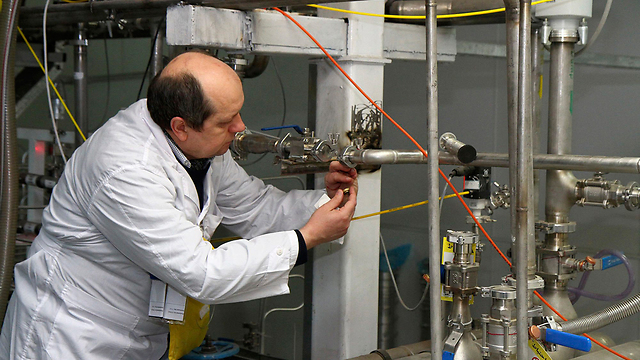Iran’s uranium stockpile grows before deadline for nuclear deal
Ynetnews/Reuters/ Published: 11.09.14
Low-enriched uranium gas stockpile grew by 8% to nearly 8.4 tons in about two months, IAEA says; chief Iranian nuclear negotiator believes both sides determined to reach deal by Nov. 24 deadline.
VIENNA – Iran’s stockpile of low-enriched uranium gas has grown by 8 percent to nearly 8.4 tons in about two months, UN atomic inspectors say, an amount world powers probably will want to see cut under any nuclear deal with Tehran.
The International Atomic Energy Agency issued a confidential report on Iran to IAEA member states on Friday, less than three weeks before a Nov. 24 deadline for Iran and six world powers to resolve their stand-off over Tehran’s atomic activities.
Iran’s holding of refined uranium gas is one of the factors that could determine how much time it would need for any attempt to assemble nuclear weapons. Iran says it has no such goal but the West wants verifiable action by the Islamic Republic to make sure it cannot produce an atomic bomb any time soon. Iran and the six states will meet in Vienna from Nov. 18 to try to seal a long-term agreement to end a dispute that over the last decade has often raised fears of a new Middle East war. The IAEA report said Iran’s stock of uranium gas refined to a fissile concentration of up to 5 percent stood at 8,390 kg, a rise of 625 kg since its previous report in September.
Iran says it produces enriched uranium to make fuel for nuclear power plants. But if processed to a high degree, 90 percent, the material could also provide the fissile core of a nuclear weapon, which the West fears may be its ultimate aim. Iran halted its most sensitive enrichment work – of 20 percent refined uranium – under an interim deal with the powers last November. But it is still making the lower-grade uranium. Western experts say Iran would now be able to amass enough high-enriched fissile material for one bomb in a few months, if it opted for such a weapon of mass destruction. The United States wants this “breakout time” extended to at least a year. One way to help achieve that, Western officials and experts say, is for Iran to ship out a large part of its stockpile to Russia where it would be turned into nuclear fuel rods, making it much more difficult to process into bomb material. Diplomats said there was as yet no agreement on this issue and that the main sticking point in the talks – Iran’s overall enrichment capacity – remained unresolved. “It’s a piece of the puzzle,” one Western diplomat said. “The Iranians agree on the principle, but it’s a point that doesn’t resolve everything.”
Current gaps notwithstanding, Iran’s Deputy Foreign Minister, Abbas Araghchi, said Tehran believes both sides are resolved to reach a deal by the self-imposed Nov. 24 deadline.
“No middle solutions exist and all our thoughts are focused on how to reach a settlement,” Araghchi, Iran’s chief negotiatior, told the state news agency IRNA.
“No one wants to return to the way things were before the Geneva Agreement. That would be too risky a scenario,” he said, referring to the preliminary accord reached a year ago under which Iran has curbed some sensitive nuclear activity in exchange for limited relief from international sanctions. “Both sides are aware of this, which is why I think a deal is within reach. We are serious and I can see the same resolve on the other side,” Araghchi was quoted by IRNA as saying. Kerry said on Wednesday the negotiations would get more difficult if the Nov. 24 deadline were missed, and the powers were not – for now – weighing any extension to the talks. His remarks seemed aimed in part at raising the pressure on Tehran to agree to the deal, which would include tougher UN inspections to verify Iran is complying with its provisions. Iran agreed under last year’s temporary accord with the United States, France, Germany, Russia, Britain and China to limit its reserve of low-enriched uranium gas by converting new production into a less proliferation-sensitive oxide form, which it started doing a few months ago. The stockpile is now above the defined level but Iran still has time to reduce it before the temporary deal expires this month, when it is supposed to be replaced by a long-term one.
Mark Fitzpatrick, director of the non-proliferation program at the International Institute for Strategic Studies think-tank, said he believed the powers would want to see the holding sharply reduced in any permanent settlement.
“If the stockpile is eliminated, then it may be possible to allow Iran a larger number of centrifuges,” he said, referring to the machines that produce enriched uranium.




















